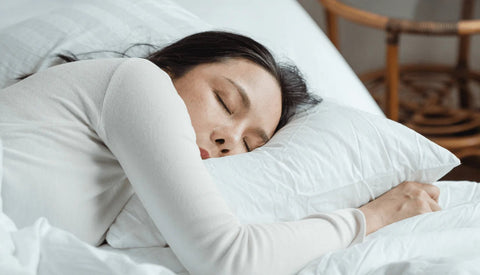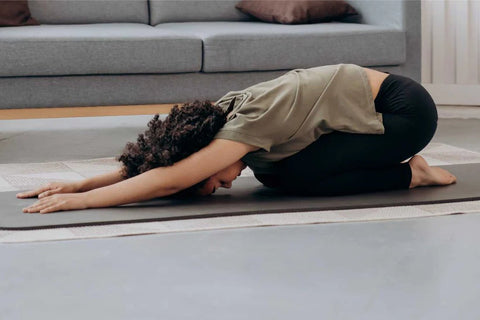Sleep like a baby and wake up refreshed. It sounds so simple, yet it doesn't work for many people. While sleeping, your body recharges, and you wake up feeling refreshed, revitalized, ready, and raring to take on the day.
It's essential to practice sleeping hygiene because good sleep and getting enough rest overall are essential for your health. In this article, we prepared nine tips on how you can sleep better in the future.
Facts About Healthy Sleep
How is healthy sleep assessed? What is normal, and what indicates sleep disorders? Here are helpful facts about healthy sleep:
- On average, adults sleep 7-10 hours a day. However, it is not necessarily the duration that is decisive for a good night's sleep, but the sleep quality.
- It takes most people between 7 and 30 minutes to fall asleep. If you toss and turn in bed for hours before falling asleep, this is a sign of a sleep disorder.
- The ideal room climate is16 to 18 degrees Celsius, with a humidity of 50%.
- The sleep phases at a glance: (falling asleep), light sleep, deep sleep, and dream phases (REM) follow one another several times. The deep sleep phase and REM sleep are essential for restful sleep.
- Due to the COVID-19 pandemic, around one in five working people is sleeping worse. Increased stress and anxiety could be responsible for this.
- Our immune system is particularly active while we sleep, so a good night's sleep promotes health.
- During the night, we wake up about 28 times without realizing it. On the other hand, if you are often conscious and awake for a long time, this can worsen sleep quality.
Sleep Better: 9 Tips
Finally, restful sleep! With these tips for a healthy sleep routine, it works.
1. The Right Mattress
Sometimes the cause of frequent waking up is quite bland. You're just too uncomfortable. Bodyweight and sleeping position, for example, are influencing factors for the type of mattress. Get advice from a specialist shop to find the right bed for you.
It is also worth investing in a high-quality mattress in the long term because an incorrect position can cause back pain.

Ad
2. Blankets, Pillows, and Co.
Anyone who freezes in bed or wakes up sweaty may not have the right blanket. Depending on the season and individual needs, the choice can fall on different products. For example, cozy-down comforters are perfect for winter - they are warming and breathable at the same time.
By the way: It can also be certified. Global Traceable Down Standard (Global TDS) and Responsible Down Standard (RDS) are committed to animal welfare.
Weighted blankets are trendy right now. The slight pressure is intended to activate the vegetative nervous system and thus calming effect.
There are also special pillows for side sleepers, which are designed to prevent neck pain..
3. Bring Movement Into Everyday Life
Better sleep starts during the day. If you sit or lie down all day, you feel restless in the evening. A long evening walk can get you moving and relaxing and make it easier for you to fall asleep.
Intense exercise, on the other hand, wakes you up. You should therefore avoid exercising late in the evening.
4. Reduce Light Sources
Light makes it difficult to fall asleep, and it's not a secret. If our eyes perceive light, this influences the circadian rhythms. The production of the hormone melatonin is then inhibited. However, this is crucial for a good night's sleep.
RECOVER by CLAV can help you fall asleep. It contains sleep-inducing melatonin and herbal ingredients for restful sleep.
Avoid light sources up to 30 minutes before bedtime. Blue light, in particular, wakes you up. Therefore, the use of special glasses with a blue light filter can be helpful. You can usually set an evening mode with a blue light filter on your cell phone, tablet and PC. Enable this feature or omit these devices entirely in the evening.

Ad
5. Refraining From Alcohol
Alcohol impacts sleeping quality. You can indeed fall asleep faster after a nightcap. However, you are not recovered the next day because your deep sleep phase is shortened.
6. Keep Calm
Whether aircraft noise, public transport, or the television: loud noises make it difficult to fall asleep and wake up more often during the night. It would help if you reduced all disturbing noises that you can control. You can reduce the street noise with earplugs, for example.
But inner peace is also essential for better sleep. Switching off the carousel of thoughts is not that easy. Meditation and breathing exercises can help you with this.
7. Maintain Sleep Rhythm
Train your body for a fixed sleep schedule. It is also better to go to bed and get up at about the same time on the weekend as during the week. Otherwise, this is similar to weekly jet lag for your body.
8. Healthy Eating - Benefit from Your Nutrition
If you want to sleep well, you should also attach importance to a healthy diet. Specific vitamins, such as Vitamin B12 deficiency, can cause fatigue. So make sure you have a sufficient supply. Here you can find out which vitamins help against fatigue.
L-tryptophan is crucial for a good night's sleep. The body depends on it to be able to form melatonin. You can get this dietary component from protein-rich foods such as dairy products or oatmeal.
Also, don't go to bed hungry or on a full stomach.
9. Take Advantage of Nature
Many plants contain sleep-promoting ingredients. One of the most famous examples is the valerian root. With the essential oils it has, it is said to make it easier to fall asleep and sleep through the night. Similar effects are also attributed to lemon balm, passionflower, and hops.
RECOVER contains these natural plant extracts for restful sleep.

Ad
What to Do if the Tips Don't Help?
Insomnia is no small thing. Long-term sleep problems can be detrimental to your health. The immune system weakens, and you are therefore more susceptible to infections. But mental health can also suffer. If all the tips and tricks for sleeping better and falling asleep faster don't help, you should see a doctor. An examination in a sleep laboratory or other tests may provide information about your sleep disorders.
Sleep Better: Conclusion
Create ideal conditions for a good night's sleep with a suitable mattress, duvet, and pillow. Alcohol and disturbing noises impair sleep quality and should therefore be reduced. Light, lack of exercise, and melatonin deficiency, on the other hand, make it difficult for you to fall asleep. You can sleep better with a healthy diet and natural, sleep-promoting ingredients from medicinal plants.
If you cannot sleep better despite all the tips and tricks, then it makes sense to ask for medical advice.
Sources:
- https://www.masterclass.com/articles/sleep-tips#9-tips-for-better-sleep
- https://www.mayoclinic.org/healthy-lifestyle/adult-health/in-depth/sleep/art-20048379
- https://www.healthline.com/nutrition/17-tips-to-sleep-better
- https://www.headspace.com/sleep/how-to-sleep-better
Disclaimer: This article is a collaborative effort of the CLAV editorial team, created on the current literature base. All our publications are supplemented with passion and expertise for naturopathy and a healthy lifestyle. Our medical experts approve all texts before publication. Please Note: Dietary supplements are no substitute for a balanced, healthy diet or medical advice.




 DE-ÖKO-006
DE-ÖKO-006
